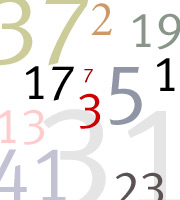Physicists from Boston University have developed a statistical tool to check heart rate. With the help of the same tool, the physicists discovered that the intervals between the initial numbers are not completely random, and that the occurrences have a certain regularity.

A group of physicists from Boston may have found a clue to a question that has troubled mathematicians for many years: do prime numbers appear within the series of whole numbers randomly or not? As we know, prime numbers are only divisible by themselves and by one, such as 7, 13 or 67. They appear at varying intervals within the set of whole numbers, and so far no formula has been found to explain these intervals. This, despite knowing what all the prime numbers are up to a number of four million digits! The present discovery happened by itself by chance:
Physicists from Boston University have developed a statistical tool to check heart rate. With the help of the same tool, the physicists discovered that the intervals between the initial numbers are not completely random, and that the occurrences have a certain regularity. However, although the results are impressive, they are still far from a true mathematical proof of the behavior of prime numbers.

2 תגובות
If we know the rules it will be much easier to identify prime numbers.
This is an interesting thing in itself, but one of the far-reaching consequences will be that many of the encryption methods used today will be called hashes because they are based on the difficulty of discovering prime numbers.
And suppose the prime numbers are not random, so what does that mean?